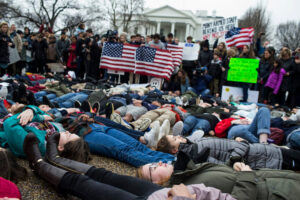by The Cowl Editor on March 1, 2018
Opinion

by Gabrielle Bianco ’21
Opinion Staff
On Feb. 14, tragedy struck in the United States. Again. Armed gunman Nikolas Cruz opened fire in Marjory Stoneman Douglas High School in Parkland, Florida. 17 people were killed including two faculty members. This horrific event is the latest one in an epidemic of gun violence in our country. In the wake of the incident, surviving students from Marjory Stoneman Douglas High School as well as citizens across the country have made impassioned pleas for gun control through legislation.
Unfortunately, despite a concerning trend in mass shootings in the U.S. becoming increasingly prevalent, little legislative reform has taken place. As the fight rages on for common sense gun reform, there are other avenues that Americans can take to combat the culture of violence that plagues the nation.
Following the recent shooting in Florida, teachers have been phenomenal advocates for change. In reaction to President Trump vocalizing his belief that educators should be armed in classrooms, teachers from around the country have responded with the #ArmMeWith campaign, in which they have expressed alternatives that will help eliminate violence, not perpetuate it.
Chris Peck, a high school English teacher from Utah, posted on social media that he wishes to be armed with “the resources and funding to help students in crisis and smaller class sizes so I can better know my students.” Brittany Wheaton, who also teaches English in Utah, posted in favor of being armed with “the resources & funding needed to help students experiencing mental health issues.”
This increase in resources and devotion to human interaction would prove invaluable. In many cases involving mass shootings, those who carry out the crime have displayed concerning behavior in the past or have a history of mental illness. By providing teachers and staff more opportunity to interact with students on a deeper level, there are more opportunities for teachers to see a student in crisis and provide them with the help they need before it is too late. Likewise, more resources through trained mental health specialists can be used to help students.
In an opinion piece for The Washington Post, statistician and former newswriter Leah Libresco went as far as to argue that approaches other than legislation are more effective in combatting gun violence. Legislation, she argues, can only go so far. After analyzing 33,000 gun related deaths, Libresco found that 2/3 of them are suicides.
Men between the ages of 15 to 34 are also at a great risk due to gang and street related violence. Domestic violence towards women also accounts for a large percentage of deaths. Libresco argues that more resources available to those contemplating suicide would be enormously beneficial.
Additionally, women in potentially dangerous relationships need to be given more attention in the criminal justice system in order to ensure their safety. Younger men at risk of street violence also need to be given resources such as mentors to help counsel them and deescalate conflicts.
The remarkable drop in violence in the city of Boston, known as the Boston Miracle, serves as a perfect example of the power of communication in reducing gun violence. In 1996, a program known as Operation Ceasefire promoted increased communication, assistance, law enforcement attention, and compassion. It was directed specifically at demographics prone to gun violence and resulted in a 63 percent reduction in monthly gun-related homicides in Boston. In the fight against gun violence, the most powerful tool can prove to be human interaction.
While people may debate as to how to decrease gun violence in the U.S., one thing is for sure: something needs to change. Since the legislative system has proven to be ineffective, energy must be put towards other avenues to stop violence as well. Many of these solutions can come as a result of civic action such as increasing communication in risk areas.
In such a turbulent time, students at Providence College, especially those entering the education field, have a unique opportunity to try to elicit change in whatever way they can. Lives are at stake and action needs to be taken